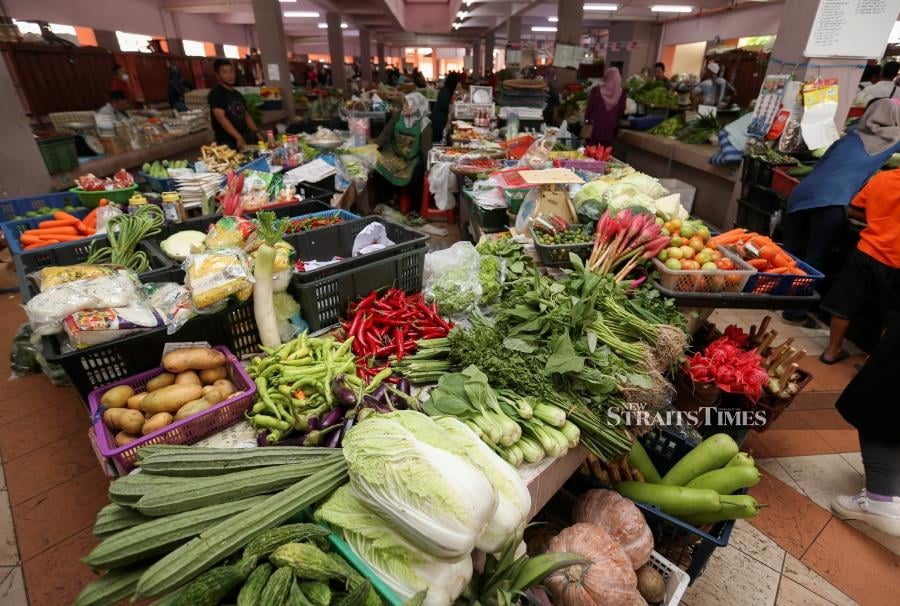RISING food prices can have dire consequences for vulnerable groups and poor households, leading to hunger, health problems, or social unrest.
Food insecurity has been linked to poverty and poor health outcomes.
It has negative effects on individual health, primarily as a result of unhealthy dietary patterns and low levels of food diversity.
These effects are more prevalent among food-insecure populations including women, children, students, and the elderly.
In Malaysia, household food insecurity was identified to be associated with poor nutritional status, either underweight or overweight.
Food insecurity will lead to poor nutrition because it will be hard to get nutritious foods which seem to be more expensive.
It occurs among those who have undergone household food insecurity for an extended period of time and have limited or uncertain access to nutritious food.
Due to poverty, many see changing consumption patterns, such as reducing expenditure on education, healthcare, and food.
In this circumstance, vulnerable households will change their eating habits, including shifting from nutrient-rich foods, such as vegetables and fruits, to high-energy-density foods, primarily carbohydrates, or cheaper processed foods to feel full longer.
People may also consume high amount of trans-fat, sugar-sweetened beverages, processed meat, sweet and bakery desserts, and nuts, but they may decrease consumption of vegetables, seeds, and legumes as well as macro and micronutrients.
Such unhealthy eating habits result in overweight or obese Malaysians.
Although such dietary practises food like fast food help to provide sufficient energy in the short term, they will have a long-term adverse effect on the health, wellbeing, and productivity of future generations and society.
Poor or low-income individuals will prioritise affordably priced, appetising, long-lasting, satiating, and easy-to-eat items based on their limited financial resources, regardless of the aspects of nutritional value, quality, or health requirements.
The selection criteria resemble processed foods that currently dominate the market. Therefore, malnutrition will persist in those susceptible groups if such food becomes their main choice.
Processed foods also reflect economic and social inequality and also disrupt today's society and health system. Furthermore, the prevalence of non-communicable diseases and malnutrition will continue to be rampant due to unhealthy eating habits.
According to the 2020 Global Nutrition Report, one out of every five children under the age of five is stunted, which is a particularly alarming statistic.
In Malaysia, the prevalence of childhood stunting is nearly three times higher than other upper-middle-income countries.
In 2020, the number of malnourished people continued to increase globally. It is noteworthy that in 2020, between 720 and 811 million people worldwide experienced hunger.
There are many factors that contribute to this situation, including a lack of nutritious food supply and rising prices.
Hunger is a dangerous cycle that passes from generation to generation.
Families suffering from chronic hunger and malnutrition frequently lack the nutrients that their bodies and minds require, which prevents them from performing optimally at work, school, or improving their lives.
Chronic hunger causes recurring illnesses, developmental disabilities, and poor productivity. The effects of severe food insecurity were observed adversely among children.
It is associated with slower child development and poorer academic performance. It may also have an adverse effect on health outcomes, such as increased hospitalisation and illness recovery times.
In light of the significant negative health effects of food insecurity, holistic action should be taken to tackle household food insecurity.
Specific intervention programmes can be implemented to reduce the prevalence of household food insecurity before it worsens as a result of rising living costs and global economic instability.
As poverty is intertwined with food insecurity, it is believed that an increase in individual or household income is a strategy to combat both food insecurity and poverty.
Thus, both short-term and long-term strategies are needed to provide immediate solutions, including improvements in household income, employability, food assistance programmes, access to education, and public education on nutrition to increase health literacy.
Both the community and the government need to work together in planning effective measures to prevent malnutrition and encourage healthy living.
The accessibility of high-quality food, social equity, and the empowerment of local communities are the crucial elements that must be addressed in order to combat the issue of malnutrition successfully.
Having sufficient food to eat is a basic human right and Allah mentions it in the Quran:
"And He placed on the earth firmly set mountains over its surface, and He blessed it and determined therein its [creatures] sustenance in four days without distinction—for [the information] of those who ask"; (Surah Fussilat 41: 10).
The writer is fellow at the Centre for the Study of Science and the Environment, Institute of Islamic Understanding Malaysia (Ikim)





